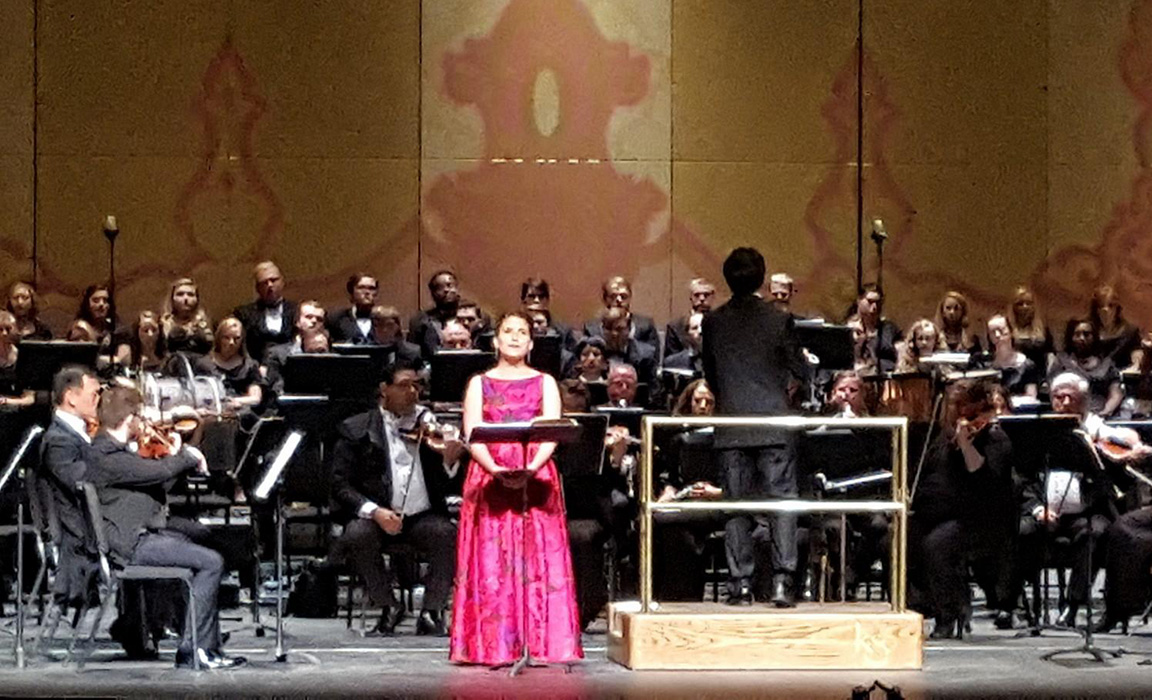As I threaded my way along the bustling sidewalks of downtown amid the intoxicating sounds and smells of the warm evening, headed for the Tennessee Theatre and the opening performances of the Knoxville Symphony Orchestra’s 2017-18 season, I realized the problem at hand. It was becoming increasingly difficult to actually imagine that downtown had ever been any other way. Both an earlier 1920-30s of streets jammed with autos and streetcars, and the sadness of a cleaner, but emptier, “pre-revitalization” downtown, were images getting hazier with time. While the KSO’s program, “Knoxville Postcards,” was recalling days gone by, portals to the past—musical or otherwise—don’t really exist. Live performances survive in the present, their modernity clear and inescapable. Would these concerts be the musical equivalent of wistfully thumbing through an intriguing scrapbook? Or, would they be the means to reflect on a colorful past, while embracing a vibrant, energetic future? I’m happy to say the KSO performances of this weekend were definitely the latter.
By the Friday evening performance, the orchestra, under music director and conductor Aram Demirjian, seemed to have picked up where they left off at the end of last season in terms of cohesive ensemble playing and superb orchestral balance. A great test of professional flexibility came in the opening work, Overture to Knoxville, a piece commissioned by the KSO for this opening concert from the young American composer, Michael Schachter. With the physical complications of groups of brass players from UT’s Brass ensembles in the balcony playing bursts of antiphonal fanfare, combined with the rhythmically complex, but poignantly lyrical work, Overture to Knoxville was not only a test of logistics, but a test of the orchestra’s spirit—one that was passed with flying colors.
Schachter’s work—the bold juxtaposed against the sweetly restrained—gave us a refreshing contrast of musical images from the vantage point of an apparently unbiased observer. Submerged in his orchestral color were barely discernible suggestions of bluegrass music and folk motifs, although the overall musical portrait was that of a clean, energetic, urban environment reconciled to its past, but happily moving forward.
Knoxville Poet Laureate R. B. Morris was on hand for two readings from James Agee’s work, the first of which, an excerpt from A Death in the Family, set up the next work on the program, Samuel Barber’s Knoxville: Summer of 1915, featuring soprano Joélle Harvey.
Harvey has a perfect voice for the Barber, one that has a natural clarity, free of any excesses of vibrato—a voice with surprising power that moved through the Agee text with sympathetic sweetness and clean diction. However, having heard three performances of the work over the last several years in the Tennessee Theatre, with three different sopranos of varying styles, I think we can all agree that the front apron of the theatre, outside the support of the orchestra shell, is not the place for a lyrical soprano in a piece such as Knoxville: Summer of 1915. By Friday evening, Demirjian had recognized the issue and encouraged listeners to follow along with the text in their programs. This problem aside, Harvey, Demirjian, and the orchestra offered an otherwise entrancing performance of the work.
Despite that one acoustic snafu, the amazingly warm, supportive resonance of the Tennessee Theatre was perfect for the final two works on the program: the orchestral suite from Aaron Copland’s opera, The Tender Land, and Sergei Rachmaninoff’s Symphonic Dances.
Another R. B. Morris reading from Agee’s Let Us Now Praise Famous Men set up the Copland, a three movement work that chooses to reflect the spirit of the full opera, rather than act as a distillation. As a result, Demirjian and the orchestra attacked the work as one might do a tone poem. The ensemble luxuriated in Copland’s rich orchestration that is descriptive with woodwind textures and luscious from long, lyrical lines in the strings. The excellent Carson-Newman A Capella Choir joined the orchestra in the final movement: “The Promise of Living.”
This weekend’s KSO performance of Rachmaninoff’s Symphonic Dances will certainly be a candidate for the year’s most memorable list owing to some superb ensemble playing and Demirjian’s sculpting of dynamics. Because the work is not performed all that often, its freshness and inventiveness always seems to surprise. That freshness is somewhat ironic, seeing that Symphonic Dances was Rachmaninoff’s last composition, written barely three years before his death.
A fair degree of that freshness comes from the diverse instrumental color of the piece, helped along by fine performances from KSO woodwind players: some luscious saxophone passages from Allison Adams and atmospheric ones from bass clarinet Victor Chavez. Oboe (Claire Chenette) and English horn (Ayca Yayman) passages were beautifully rendered with a significant prominence. The KSO’s new concertmaster, William Shaub, gave a splendid reading of his solo passage.
Did anyone in the audience leave the theatre wistfully wishing to return to that Knoxville of old, that Knoxville that looks much more pleasant in the rear view mirror? Probably not. But did they leave the theatre with a joyous basis for optimism for this season’s KSO? Undoubtedly.
Photo courtesy of the Knoxville Symphony Orchestra







